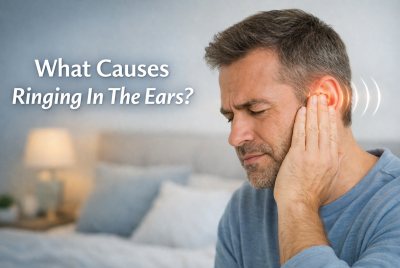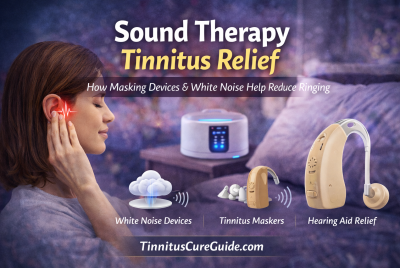When Neck Tightness Causing Ear Ringing? Understanding the Connection and Finding Relief
When a Stiff Neck Leads to Ringing in Your Ears
If you’ve ever noticed your ears buzzing, ringing, or producing a high-pitched noise after a long day of poor posture, desk work, or stress, you’re not alone. Many tinnitus sufferers report that their symptoms flare when their neck or shoulder muscles tighten. This condition, often overlooked, highlights the link between neck tightness causing ear ringing—a form of somatic tinnitus where muscle tension and nerve irritation trigger or worsen ear noises.
In this article, we’ll explore the science behind this connection, the symptoms to watch for, effective treatments, lifestyle changes, and practical prevention tips you can use daily.
Can Neck Tightness Really Cause Ear Ringing?
Yes — research shows that neck muscle tension, poor posture, and cervical spine issues can directly influence auditory signals, leading to tinnitus. This type is often called cervicogenic or somatic tinnitus.
When neck muscles are tight, they can:
-
Restrict blood flow to the inner ear.
-
Irritates nerves connecting the cervical spine to the auditory pathways.
-
Misaligned posture puts extra strain on the neck and jaw muscles.
A 2018 study published in Frontiers in Neurology noted that patients with cervical spine disorders reported a higher prevalence of tinnitus, suggesting a clear neuromuscular connection.
Symptoms of Neck Tightness Causing Ear Ringing
If your tinnitus worsens with certain movements or muscle strain, it may be linked to your neck. Common signs include:
-
Ringing, buzzing, or whooshing in the ears after long desk hours.
-
Neck stiffness or pain that coincides with ear ringing.
-
Ear ringing at night when lying in certain positions.
-
Changes in tinnitus intensity when turning your head or shrugging your shoulders.
-
Headaches and jaw tension accompanying ear buzzing sound.
Recognizing these patterns can help your doctor or physical therapist confirm if your tinnitus is muscle-related.
Causes: Why Neck Tension Triggers Ear Ringing
1. Poor Posture and Desk Work
Slouching at a computer for hours misaligns the cervical spine, tightening muscles and compressing nerves. This posture-related strain is a common trigger for constant ear ringing.
2. Stress and Muscle Clenching
Chronic stress causes unconscious clenching of neck and shoulder muscles, worsening tinnitus. The stress and tinnitus connection is well-documented in U.S. health studies.
3. Cervical Spine Disorders
Conditions like herniated discs, arthritis, or whiplash may lead to cervical tinnitus causes, disrupting nerve pathways linked to hearing.
4. Reduced Blood Flow
Tight muscles restrict blood circulation to the auditory system, contributing to pulsatile tinnitus or throbbing sounds in the ear.
Treatments for Neck Tightness Causing Ear Ringing
Finding relief requires addressing both tinnitus and the underlying muscle tension.
Home Remedies
-
Heat Therapy: Apply a warm compress or heating pad to relax neck muscles.
-
Gentle Stretching: Try neck rolls, chin tucks, and shoulder shrugs daily.
-
Massage: Self-massage or professional therapy reduces stiffness and improves blood flow.
-
Hydration & Diet: Proper hydration and magnesium-rich foods help reduce muscle cramps.
Medical Treatments
-
Physical Therapy: Trains proper posture, alignment, and mobility.
-
Chiropractic Adjustments: May relieve nerve compression contributing to tinnitus.
-
Trigger Point Injections: For chronic muscle spasms that worsen tinnitus.
-
Medications: Anti-inflammatories or muscle relaxants in severe cases.
Technology Aids
-
Tinnitus Sound Therapy Apps like ReSound Relief or Calm offer white noise and masking options.
-
Sound Masking Devices & Hearing Aids help reduce the perception of constant ear ringing.
Natural Remedies for Neck Tightness Causing Ear Ringing
-
If you suspect your ear ringing is linked to neck tightness, addressing muscle tension naturally can reduce both discomfort and tinnitus flare-ups. While results vary, many people find relief through these approaches:
1. Stretching and Gentle Neck Exercises
-
Daily neck stretches can release tension in the sternocleidomastoid and trapezius muscles, which are often connected to tinnitus symptoms.
-
Try gentle side-to-side movements, chin tucks, and shoulder rolls.
-
Consistency matters more than intensity — aim for 5–10 minutes twice a day.
2. Heat and Cold Therapy
-
Apply a warm compress or heating pad to loosen stiff muscles.
-
For acute tightness or inflammation, try a cold pack for 10–15 minutes.
-
Alternating hot and cold can improve blood circulation and reduce pain.
3. Massage and Trigger Point Release
-
Self-massage along the base of the skull and upper neck can ease tightness.
-
Foam rollers or massage balls help release trigger points in the shoulders and upper back.
-
Professional therapeutic massage may provide longer-lasting relief.
4. Stress Reduction and Relaxation Techniques
-
Stress often worsens both muscle tightness and tinnitus.
-
Practices like deep breathing, meditation, and yoga help calm the nervous system.
-
Mind-body therapies such as progressive muscle relaxation can reduce involuntary clenching of the neck and shoulders.
5. Magnesium and Anti-Inflammatory Nutrition
-
Magnesium-rich foods (spinach, almonds, avocados) may help relax muscles naturally.
-
An anti-inflammatory diet with omega-3 fatty acids (salmon, walnuts, flaxseeds) supports muscle and nerve health.
-
Staying hydrated is equally important for preventing stiffness.
6. Posture and Ergonomics
-
Poor posture while working at a desk can strain the neck and contribute to tinnitus.
-
Adjust your chair and monitor so your screen is at eye level.
-
Take breaks every 30–60 minutes to stretch and move.
7. Alternative and Complementary Approaches
-
Acupuncture has been shown in some studies to reduce tinnitus severity by improving circulation and relaxing muscle tension.
-
Chiropractic adjustments may help realign the cervical spine when misalignment contributes to ear ringing.
-
Herbal remedies like ginkgo biloba or turmeric may support blood flow and reduce inflammation, though results differ from person to person.
👉 These natural remedies work best when combined with good lifestyle habits and proper medical guidance. If ear ringing persists or worsens, consulting a healthcare provider is essential to rule out underlying conditions.
-
Prevention Tips: Avoiding Neck-Related Ear Ringing
While not every case of tinnitus is preventable, many people can reduce the risk of neck tightness causing ear ringing by making simple lifestyle adjustments. These prevention strategies focus on posture, daily habits, and overall muscle health:
1. Maintain Good Posture
-
Sit and stand tall, keeping your shoulders relaxed and your back straight.
-
Avoid slouching at your desk or craning your neck forward when looking at screens.
-
Try the “20-20-20” rule: every 20 minutes, look 20 feet away for 20 seconds to reset posture.
2. Ergonomic Workstation Setup
-
Position your computer monitor at eye level to avoid straining your neck.
-
Use a chair with lumbar and neck support.
-
Consider a standing desk or adjustable workstation to reduce stiffness from prolonged sitting.
3. Regular Stretching and Movement
-
Incorporate neck and shoulder stretches into your daily routine.
-
Take short breaks every hour to roll your shoulders, rotate your neck, and walk around.
-
Gentle yoga poses like cat-cow or child’s pose can relieve tension and support flexibility.
4. Stress and Tension Management
-
High stress often leads to involuntary muscle clenching, worsening tinnitus.
-
Practice stress-reducing activities such as meditation, journaling, or tai chi.
-
Even deep breathing exercises can ease muscle tension in the neck and shoulders.
5. Sleep Position Awareness
-
Sleeping on your stomach can strain the neck and aggravate tinnitus.
-
Use a supportive pillow that keeps your head aligned with your spine.
-
Side or back sleeping with proper support reduces pressure on the neck muscles.
6. Exercise and Strength Training
-
Strengthening the neck, shoulders, and upper back muscles helps prevent chronic tightness.
-
Low-impact workouts like swimming, Pilates, or resistance band training support better posture.
-
Regular physical activity also improves circulation, which may ease tinnitus.
7. Avoid Overuse and Repetitive Strain
-
Be cautious when lifting heavy objects or carrying bags on one shoulder.
-
Limit extended use of smartphones (“tech neck”) by holding devices at eye level.
-
Stretch after workouts or long drives to prevent muscle stiffness.
8. Stay Hydrated and Nourished
-
Dehydration can worsen muscle cramping and stiffness.
-
Eat a nutrient-rich diet with magnesium, vitamin B-complex, and omega-3 fatty acids to support muscle and nerve health.
👉 By combining posture awareness, regular movement, stress management, and ergonomic adjustments, you can significantly reduce the chances of neck-related ear ringing becoming a chronic issue.
Real-Life Coping Strategies
-
At Work: Schedule “micro-breaks” to stretch your shoulders and neck.
-
At Home: Swap screen time for light movement, yoga, or stretching.
-
At Night: Use white noise machines or apps to mask ear ringing at night.
-
Daily Routine: Journal when tinnitus worsens — patterns often reveal posture or stress triggers.
When to See a Doctor
While occasional ear ringing linked to neck tightness may improve with stretching, rest, and posture correction, there are times when professional care is essential. You should seek medical attention if you experience:
-
Persistent ear ringing that lasts longer than a few weeks and does not improve with self-care.
-
Sudden onset tinnitus after an injury, whiplash, or accident involving the head or neck.
-
Severe neck pain or stiffness that limits your range of motion or interferes with daily activities.
-
Associated symptoms such as dizziness, balance problems, blurred vision, headaches, or weakness in the arms and hands.
-
Unilateral tinnitus (ringing in only one ear), which could signal a more serious condition.
-
Hearing loss or a sudden change in how you hear sounds.
👉 If any of these occur, consult a primary care physician, ENT (ear, nose, and throat specialist), or neurologist. Early evaluation can help rule out underlying conditions and guide appropriate treatment for both your tinnitus and neck issues.
FAQs on Neck Tightness Causing Ear Ringing
1. Can neck tightness really cause ear ringing?
Yes. Tight muscles and cervical spine issues can irritate nerves and reduce blood flow, leading to tinnitus symptoms.
2. How do I know if my tinnitus is from my neck?
If your ear ringing changes with posture, head movement, or massage, it’s likely related to muscle tension.
3. What is the best exercise for neck-related tinnitus?
Chin tucks, gentle neck rotations, and shoulder blade squeezes can ease tension and reduce symptoms.
4. Can stress make tinnitus worse through neck tightness?
Absolutely. Stress increases muscle clenching in the neck and shoulders, intensifying ringing in ears.
5. Is neck-related tinnitus permanent?
Not always. Addressing posture, stress, and muscle health often reduces or resolves symptoms.
6. Do chiropractors help with tinnitus from neck tension?
Some patients report relief after chiropractic adjustments, especially if nerve compression contributes to tinnitus.
7. Should I see a doctor for neck-related tinnitus?
Yes. An ENT or physical therapist can confirm the cause and recommend tailored treatments.
Conclusion: Taking Control of Your Neck and Ear Health
Neck tightness causing ear ringing is a common but often overlooked trigger for tinnitus. By correcting posture, reducing stress, and incorporating natural remedies, many sufferers find relief. Remember: small daily changes like stretching, ergonomics, and relaxation can make a big difference. If symptoms persist, consult a healthcare provider for personalized care.
Disclaimer
This article is for informational purposes only and is not a substitute for professional medical advice. Tinnitus and its causes vary by individual. Always consult with a qualified healthcare provider, audiologist, or ENT specialist before beginning any treatment or exercise program.

- Stiff Shoulders Causing Ear Ringing
- Ringing in Ears After Cold or Flu
- Somatic Tinnitus Causes and Treatments





